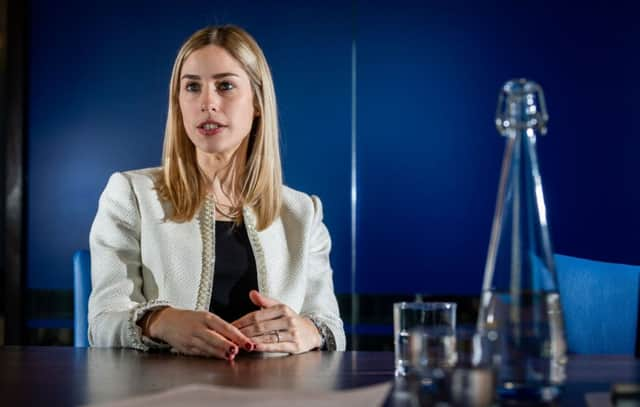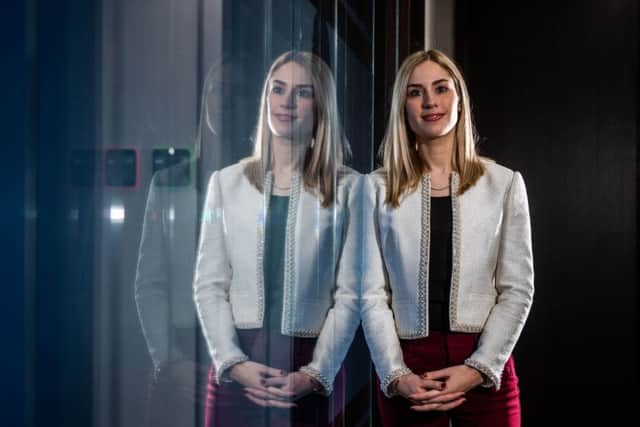Meet the lawyer who is helping global entrepreneurs to create jobs in Britain


WE’RE a nation of immigrants. Most of us can trace our roots back to people who came to Britain in search of work and the chance of prosperity.
Brexit has cast a cloud over the topic, so it’s refreshing to have shafts of light cast by an expert .
Advertisement
Hide AdAdvertisement
Hide AdFlora Mewies of law firm Ward Hadaway is an immigration specialist who helps talented people from overseas create jobs in the North of England.


During a period of change, it’s wise to take a calm appraisal of a subject which usually generates more heat than illumination. Ms Mewies, who is part of Ward Hadaway’s Leeds-based team, will not be idle over the next few months, with Brexit focusing minds as the skills gap widens.
A recent Open University report revealed that three in five employers believe skills shortages had worsened since 2017.
The findings also suggested uncertainties with EU nationals’ rights as a result of Brexit, which is causing concern among businesses and individuals.
Advertisement
Hide AdAdvertisement
Hide AdMs Mewies, who was shortlisted for a Rising Star Award in the 2018 Yorkshire Legal Awards, said: “One of the misconceptions is that immigration is detrimental to the country because it’s believed that overseas workers are taking jobs away from workers in the UK. In my own experience, that is very rarely the case.


“In certain pockets of industry, such as technology, they need key individuals in place to service their clients and grow that business, but there simply isn’t that talent within the local market.
“They have to look externally, otherwise they would be disadvantaged.”
Talented individuals from overseas are creating enterprises around Britain. Ms Mewies is proud of her firm’s connections with StudyAtlas a platform that allows prospective international students to explore, compare and apply for courses at universities in the UK, Australia and New Zealand for free.
Advertisement
Hide AdAdvertisement
Hide AdThe education technology start-up was established in 2016 by Sri Lankan entrepreneurs, Asanka Jayaweera and Buddhika Herath, to help international students applying for higher education courses around the world. Ms Mewies advised Mr Jayaweera on his successful UK visa application which has allowed him to continue with this business.


She said: “The tier 1 exceptional talent visa is for people who have the potential or who are already established as world leaders in their field.”
Ms Mewies said: “He’s been able to come to the UK and bring his wife, who is his business partner to the UK with him, and they have established their organisation in Newcastle.”
Which bring us to Brexit. Large proportions of Ms Mewies’ clients work in sectors that have skills shortages in the UK, particularly in the North.
Advertisement
Hide AdAdvertisement
Hide AdShe said; “In sectors such as manufacturing and hospitality, where there have been a skills shortage, they have in the past relied quite heavily on EU workers who are in the UK and can travel freely in and out.


“We’ve had a lot of concern from organisations in those sectors that post-Brexit, will they be able to recruit people to take on those roles?
“Naturally, they would love to recruit local talent, but at the same time they have got more jobs than they have people applying for them. So they have a skills shortage.
“We’ve been working with those organisations to explain and encourage their current EU workers as to what their rights are, so they’ve got some certainty and they understand they will be able to carry on working here.
Advertisement
Hide AdAdvertisement
Hide Ad“It’s provided some reassurance to help stop employees leaving.”
There is evidence that Brexit has already led to the departure of some EU nationals.
Ms Mewies added: “We’ve definitely had clients who have had EU members of staff leaving because they felt it provides them and their family with some certainty.
“That leaves our clients and local employers with a vacancy they are not able to fill.
Advertisement
Hide AdAdvertisement
Hide Ad“A large part of the work I am doing in the run-up to Brexit about EU nationals is around raising awareness and trying to communicate with a pool of employees, usually through the HR (human resources) team, about what the future will be.
There are steps that EU nationals can be taking now ahead of March 29 in order to secure their status.
“From January 21, they are rolling out the EU settlement scheme which is a registration process that EU nationals can apply for in order to secure their position in the UK post Brexit.”
Workers from overseas often develop strong ties to their employer and their new home nation. “They have often faced challenges in trying to upskill themselves to get to a level where they can come to the UK and take on one of these roles,”
Advertisement
Hide AdAdvertisement
Hide AdMs Mewies said. “They are very keen to give back to their local community.”
This gratitude often manifests itself in a commitment to mentoring younger workers or becoming school governors. Nothing can beat the thrill of transforming a client’s life by helping them obtain a visa.
She said: “When somebody gets their visa granted, it can be life-changing for some people They can start up their own business and perhaps be a consultant or self-employed.
“It really does open up a huge number of opportunities for them.”
Advertisement
Hide AdAdvertisement
Hide AdShe questions whether the Home Office has the resources to deal with the vast numbers of visa applications which it is expected to receive after Brexit.
She said: “The new regime for applications for visas by skilled migrants post-Brexit will be phased in in 2021 and the Government has committed in its most recent White Paper to processing skilled migrant visa applications in two to three weeks, whereas currently, this is often eight weeks.”
Responding to these comments, a Home Office spokesperson said: “The future immigration and borders system will be streamlined to reduce costs and bureaucracy. We are investing in staff and technology ahead of the introduction at the end of the Implementation Period.
“Border Force has already recruited a Readiness Task Force to provide operational resilience to the front line and allow existing staff to undertake EU exit related training. In addition, Border Force is on track to increase its headcount by 900 full-time equivalent by the end of March 2019.
Advertisement
Hide AdAdvertisement
Hide Ad“UK visa applications are already processed quickly, with 96 per cent of non-settlement visa applications decided within our standard 15 working days’ processing time in the year ending June 2018.”
Ms Mewies believes that growing numbers of young lawyers understand that all roads don’t lead to London and the South East.
She added: “Sometimes we can be asked in a graduate recruitment situation whether we work with clients in London.
“People don’t perhaps always understand that, while we are based in Leeds, Manchester and Newcastle we have clients all over the country.
“The calibre of businesses we work with in the North are of the same high standard as those in the South.”